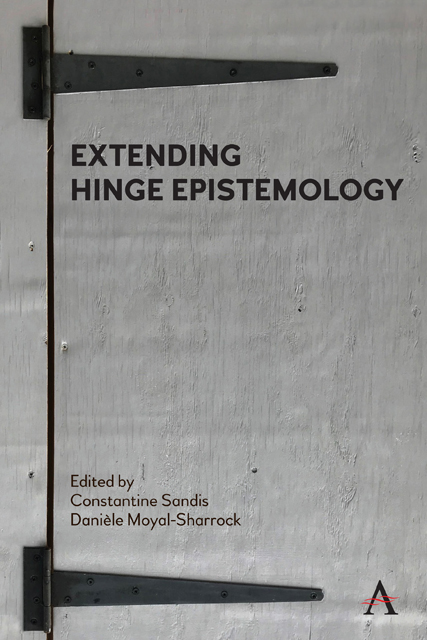Introduction: Fastening the Hinges, Opening the Door
Published online by Cambridge University Press: 09 December 2022
Summary
Hinge epistemology is a new branch of philosophy inspired by Ludwig Wittgenstein's view in On Certainty that ‘the questions that we raise, and our doubts, depend on the fact that some propositions are exempt from doubt, are as it were like hinges on which those turn’ (OC 341). Hinge epistemology is rapidly becoming one of the most exciting areas of epistemology and Wittgenstein studies. Connecting these two fields brings a revived energy to both, opening them up to fresh developments. The first collection on the topic, Hinge Epistemolog y (Brill, 2016), edited by Annalisa Coliva and Danièle Moyal-Sharrock, served as a general introduction. The volume you hold in your hands (or which appears on your screen) extends hinge epistemology in the following two ways:
(i) Fastening the hinges: In the opening chapters of the book, proponents of the three major perspectives on the nature of hinge certainties strengthen their views, often by virtue of response to one another. These are followed by chapters presenting new voices and challenges within hinge epistemology.
(ii) Opening the door: The second half of the book explores new applications and directions of hinge epistemology, particularly as it relates to the philosophy of mind, society, ethics and the history of ideas.
Fastening the Hinges
The volume begins with Danièle Moyal-Sharrock's ‘Wittgenstein's Hinge Certainty’ (Chapter One). The aim of this chapter is to clarify how Moyal-Sharrock's own view of Wittgenstein's hinge epistemology differs from those of Annalisa Coliva and Duncan Pritchard. All three have been enthusiastically engaged with On Certainty for many years. Their understanding of On Certainty has been very close in many ways, but differing in others.
Moyal-Sharrock's chapter is followed by Duncan Pritchard's ‘Exploring Quasi-Fideism’ (Chapter Two). Quasi-fideism offers a distinctive account of the epistemology of religious conviction, one that draws upon the materials provided by a Wittgensteinian hinge epistemology. In this chapter, an overview of quasi-fideism is offered, including how it relates to hinge epistemology. A generic form of quasi-fideism is distinguished from one explicitly modelled along the lines of the non-belief hinge epistemology that Pritchard advocates. Some of the main objections that have been posed for the position are then considered.
- Type
- Chapter
- Information
- Extending Hinge Epistemology , pp. x - xivPublisher: Anthem PressPrint publication year: 2022



